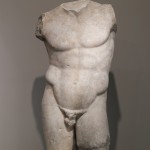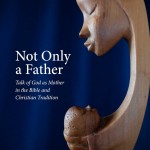In a recent post, I wrote about polytheistic religious experience from a Jungian perspective. Recently I came across two posts about the ontological nature of feminist monotheistic experience of Goddess, both on the Feminism and Religion community blog.
The first was by Molly Remer, entitled “Who is She? The Existence of an Ontological Goddess”. She writes:
“To me, Goddess is found in the act of specifically naming that ineffable sense of the sacred that we all, universally, experience or perceive at some point during our lives. […] In my own life, I call these numinous experiences Goddess and through this I know She exists in, of, around, and through the world that I live in. It is in these experiences that I touch Her directly.”
I too name the experience of the sacred as “Goddess”. Remer then goes on to explain how she relates to Goddess personally:
“My felt sense is that the Goddess IS everywhere, all the time. I also recognize that this is a personalization of the more “generic” larger forces of the world that other people may or may not find useful or appropriate in their own lives; […] Additionally, I have had a small handful of metaphysical types of experiences that convince me that there is a personal aspect/experience of Goddess as well as a more impersonal, force-of-Nature-and-the-Universe experience of Goddess.“
(italics original). Unfortunately, Remer doesn’t go on to describe her experiences of the Goddess as personal.
The second post was by a favorite author of mine, Carol Christ, entitled “Goddess as Love: From Experience to Theology”, in which she writes about her experience of Goddess as a “presence of love”.
“I had grown up with the notion that God is love, and I had also experienced the presence of God in nature, a view largely denied by my theology professors and theologians of the twentieth century. I turned to the Goddess because she is a woman like myself and also because she represented the life force in nature and its seasons and cycles. But I was not sure if Goddess is a personal presence who loves and understands or the life force itself. Because of this uncertainty, I had been unable to complete my Goddess thealogy. After my mother died, I came to understand Goddess as “the intelligent embodied love that is the ground of all being.”
“The experience I had as my mother died did not come with any words except “filled with love” and “going to love.” I did not feel Goddess loves me or God loves me or that my mother was loved by Goddess or God. I also did not feel that my mother was entering into eternal life. I simply felt the palpable presence of love in the room as she died.”
In her 1998 book, Rebirth of the Goddess, Christ also wrote about this experience and her belief in the Goddess as a personal presence:
“While I find the philosophical notions of immanence and pantheism attractive, in the end they fail to do justice to my experience of the Goddess. Like Starhawk […], I find the Goddess ‘in’ nature and ‘in’ myself. I experience the Goddess by fully entering into relationship with a particular tree, a mountain, or another person, not by trying to separate myself from other people or other beings.
“Yet for me, the Goddess is also a personal presence, a power that I invoke in prayer and ritual. When I speak the name of the Goddess, I believe I come into a relationship with a power who cares about my life and the fate of the world. The more I sing to the Goddess, pray to her, and invoke her name in my daily life, the more certain this conviction becomes. I could interpret this feeling to suggestion and interpret the voice that speaks in me and the power that acts in synchronous events that happen to me simply as projections of my own experience and deepest self. But it makes more sense to me to understand the Goddess as a kind of person, fully embodied in the world, with whom I am in relation.”
Unfortunately, in Rebirth of the Goddess, Christ never really reconciles her experience of Goddess as “a kind of person” with her desire to move beyond theistic categories. She states that a personal Goddess “makes more sense” to her, but she never really explains why.
In her later book, She Who Changes: Re-Imaging the Divine in the World, Christ attempts to do so. She draws on process theology, especially Charles Hartshorne, to further explicate her experience of Goddess as personal. In doing so, she affirms that Goddess is not a “person” in the same sense as we are, but is “personal” in the sense in which Goddess suffers with us and in some senses cares for and loves us. In the end, though, this explanation seems like a post-hoc rationalization that seems somewhat disconnected from her experience. It’s the experience that interests me and it seems clear that Christ’s notion of Goddess as a personal presence arises directly out of her experience:
“The divine sympathy is a way of understanding the experience many of us have had that divine power is present in our lives, sharing our joy and our suffering. For me the divine sympathy is a way of naming the divine presence that I experience dramatically in times of crisis and that I also experience daily in less dramatic ways. I find personal imagery of Goddess/God necessary and appropriate because I experience Goddess/God as caring about my life and the lives of all other individuals in the world.”
I should note here that Christ does not take the next step, though, to claim that Goddess intervenes in the world as a theistic deity. As Catherine Madsen writes in her essay, “If God is God She is not Nice”:
“However certain one may be that one is loved by some presence in the universe–and it is possible, at moments, to be very certain of that–that same presence will kill us all in tun, will visit our lovers with sudden and devastating illness, will freeze our crops, will age our friends, and will never for one moment stand between us and any person who wishes us harm.”
Both Remer and Christ have sophisticated understandings of deity. Were it not for their own individual experiences of a personal presence of deity, I suspect they would espouse an purely impersonal pantheistic vision of divinity. But both women were moved to a more complex understanding of divinity by their personal experience, an experience of something that they describe as “personal”, if not “a person”.
A similar experience was described by Gus DiZerega recently in a post entitled “Encountering Pagan Deities”. His description of his experience of the Goddess resembles Christ’s experience closely:
“I became a Wiccan when I encountered the Goddess immediately after She was invoked during a Midsummer Sabbat to which I had been invited. […]
“Immediately upon Her invocation a presence manifested that was more beautiful than anything I had ever experienced, more loving than anything I had ever encountered, and more powerful than anything I could ever have imagined, but not in the sense of power as force or domination. The power of Her love put any other kind of power in its shade. She brought with Her a sense of the Feminine and of nature, of forests and meadows. She had another fascinating quality: She seemed more real than I was. At the same time She was invisible.“
Here again we have the experience of something described as a “presence” which is in some sense personal. DiZerega then goes on to describe other experiences (his and others’), including those that might be characterized as more impersonal encounters.
I still feel that experiences of divinity as personal can be understood as expressions of what Christ calls our “deepest self.” The description of the experience of divinity as personal is perhaps more of a statement about the experience and the experiencer, than a statement about the “thing” being experienced. In other words, it is a “personal” experience, without being an experience of a person. But what exactly does this mean? Perhaps it means that the experiences touches the same part of us that is touched we encounter a person.
I also find the notion of divinity as a “presence” very intriguing. I have seen this experience compared to the sense that someone is in the room with you before you see them. This experience of presence is a visceral one, perhaps even a sensory one, but not a necessarily a visual one. I wonder what the relationship is between the experience of “presence” and the experience of the “personal”. These are both terms that I think deserve more exploration in thealogical and Pagan thought.
Also I wonder if divinity might also be experienced as absence, as much as presence. R.D. Laing writes that “far more people in our time neither experience the Presence of God, nor the Presence of His absence, but the absence of His Presence.” I don’t know that I agree with Laing generally, but the distinction between the “presence of an absence” and the “absence of a presence” is an interesting one. Arguably, it only makes sense to speak about an experience of presence in contrast to an experience of absence. My own experience of divinity is more often of a “presence of an absence”, a yearning, one that is sometimes quite visceral, yearning for something “more”, something I identify as “Goddess” and as “sacred”.











